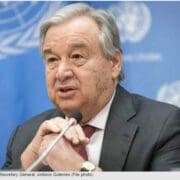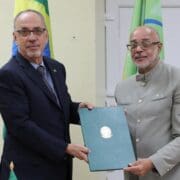Black Immigrant Daily News
By John P. Ruehl
The modern globalized world has made it easier and far more lucrative to facilitate and enable international drug networks, and several governments, or elements within them, actively work with criminal groups to support the flow of drugs around the world. This has led to a surge in drug usage among people worldwide, according to the UN Office on Drugs and Crime’s World Drug Report 2022, with 284 million people between the ages of 15 and 64 using drugs globally in 2020, which amounts to “a 26 [percent] increase over the previous decade.”
State involvement in the drug trade occurs for a variety of reasons. The allure of profiteering can entice state actors to produce and transport drugs, particularly if their country is under financial duress. Producing drugs or merely taxing drug routes can bring in much-needed funds to balance budgets, create sources of “black cash,” or enrich elites. Allowing the drug trade may also be deemed necessary to ensure regional economic stability and can prevent criminal groups from confronting the state.
In other instances, government agencies and institutions might be “captured” by criminal elements that have gained extreme influence over political, military, and judicial systems through corruption and violence. Government entities also often become too weak or compromised to stop criminal groups, which “have never before managed to acquire the degree of political influence now enjoyed by criminals in a wide range of African, [Eastern] European, and Latin American countries.”
Finally, some governments use the drug trade to promote foreign policy objectives as a form of hybrid warfare. Supporting criminal groups in rival or hostile countries can help challenge the authority of the governments in these states, but it is also an effective way to promote social destabilization. Introducing drugs to other countries fuels local criminal activity, plagues their court and prison systems, induces treatment and rehabilitation costs, and causes immense psychological stress and societal breakdown through addiction.
The Complicity of State Actors in the Drug Trade
The Russian government’s involvement in the international drug trade is due to several reasons. Russian state entities have sought to raise cash for their own benefit but have also historically worked with powerful criminal groups due to corruption and to avoid bloodshed (though the Kremlin has steadily absorbed Russia’s criminal elements under Russian President Vladimir Putin). Additionally, with the West imposing sanctions on the Kremlin after its invasion of Ukraine in February 2022, the Kremlin is seeking to punish some EU countries for supporting Kyiv by bringing drugs into the bloc, leveraging its connections to the Eurasian underworld to do so.
The Kremlin’s role in the drug trade has provided it with influence over former Soviet states in Central Asia, which have also facilitated the drug trade from Afghanistan to Europe for decades. The criminal elements that control this northern route have immense influence over the political and security elites of Central Asian states and rely on cooperation with Russian intelligence services.
Much of the drug trade provides funding for Russian intelligence services, and the Kremlin appears to have approved an increase in drug trafficking in 2022 largely because of the financial difficulties stemming from its invasion of Ukraine.
The Balkans are also a key gateway for drugs entering Europe. In Bulgaria, corruption has seen high-level politicians implicated in drug smuggling, in addition to officials in Serbia, Montenegro, and Macedonia. The Council of Europe, meanwhile, accused Hashim Tha?i, the former prime minister and president of Kosovo, as well as his political allies, of exerting “violent control over the trade in heroin and other narcotics” “and [occupying] important positions in ‘Kosovo’s mafia-like structures of organized crime’” in 2010. Kosovan politicians continue to face allegations of corruption.
Morocco’s government has largely accepted drug networks to support national economic livelihood, which serves “as the basis of a parallel economy,” while this relationship is reinforced by corruption in the country. Libya had more of a state-backed drug production and export apparatus under former leader Muammar Gaddafi, though this mechanism broke down following the civil war in 2011. However, the close relationship between Guinea-Bissau’s “political-military elites” and drug smugglers has made it Africa’s greatest example of state complicity in aiding international drug networks. The country’s importance in the international drug trade stems from its proximity to Latin America and Guinea-Bissau’s geographic use as a transit stop for criminal groups seeking access to the European market.
In recent years, politicians from Venezuela, Paraguay, Peru, Bolivia, and other Latin American countries have been accused or suspected of aiding and abetting criminals involved in the drug trade. United States officials have also accused former Honduran President Juan Orlando Hern?ndez and his political allies of “state-sponsored drug trafficking,” as he awaits trial in the United States.
But there has been a decades-long involvement of the United States in the drug trade. In the 1950s, for example, the CIA gave significant support to anti-communist rebel groups involved in the drug trade in the Golden Triangle, where the borders of Thailand, Laos, and Myanmar meet. The cooperation lasted into the 1970s, and ongoing corruption in the region means state authorities continue to permit criminal groups a degree of operability.
The CIA also admitted to ignoring reports about Nicaraguan Contra rebels selling drugs in the United States to fund their anti-communist campaign in the 1980s. The United States permitted Afghan farmers to grow opium poppy during the Obama administration’s handling of the War in Afghanistan in 2009 and has been suspected of cultivating Latin America’s drug networks to control the region.
Drug deaths in the United States have, meanwhile, been rising significantly since 2000 and hit record highs during the pandemic, with fentanyl responsible for two-thirds of total deaths. China has been accused by Washington of allowing and enabling domestic criminal groups to import fentanyl into the United States.
While this trade partially diminished after pressure from Washington, fentanyl exports from China now often make their way to Mexico first before crossing the U.S. border. China’s willingness to cooperate with U.S. authorities, as well as authorities in Australia, where Chinese drugs are also imported, has declined as relations between Beijing and Western states have worsened. China’s government is also mildly complicit in the Myanmar government’s far more active and direct role in facilitating the drug trade in Southeast Asia. This is due to Myanmar’s need to both raise funds and control militant groups in the country.
Drug Trade Supporting Economies in Some Countries
Drug production and exporting also give regimes an option for long-term survival. A 2014 report from the Committee for Human Rights in North Korea indicates that after North Korea defaulted on its international debts in 1976, its embassies were encouraged to “‘self-finance’ through ‘drug smuggling.’” In the 1990s, this gave way to state-sponsored drug production to further increase access to foreign currency.
Most of the suspected or arrested drug traffickers from North Korea over the last three decades have been diplomats, military personnel, or business owners. In 2003, Australian authorities busted a North Korean state-sponsored heroin smuggling operation while following Chinese suspects. But by 2004, China was also admitting to problems with North Korean drugs crossing their mutual border. And in 2019, Chinese authorities arrested several people with connections to the North Korean government who were involved in a drug smuggling ring near the border.
The Syrian government has produced and exported drugs for decades. But sanctions and civil war since 2011 have severely weakened Syria’s leadership, prompting it to drastically increase its drug operations to raise funds and maintain power. Exports of Captagon and hashish now generate billions of dollars a year for the Syrian government and far exceed the value of the country’s legal exports.
In neighboring Iran, government officials, as well as state-affiliated groups like Hezbollah, are also complicit in profiting off the drug trade, which also implicates Lebanese officials. Involvement in the drug trade by state-sponsored groups like Hezbollah or Turkey’s Grey Wolves reveal attempts by Tehran and Ankara respectively to make these groups self-sustaining when state support withers.
Overt participation in the drug trade by certain states is likely to continue. Sanctions help fuel the drug trade by making states more inclined to resort to these networks to make up for lost economic opportunities. Additionally, most efforts to combat the drug trade are largely domestic initiatives. Less corrupt law enforcement agencies are often unwilling to work with their counterparts in other countries through forums like Interpol, for fear of their complicity in illegal drug networks. The drug trade also remains a valuable geopolitical tool for states.
Nonetheless, state involvement in the drug trade is a risky venture. It emboldens criminal actors, often involves inviting drugs into national territory, and can result in enormous public backlash. While preventing the involvement of state actors in these practices will be a difficult task, the most overt instances should be scrutinized more thoroughly to ensure these policies are given greater attention.
This article was produced by Globetrotter.
John P. Ruehl is an Australian-American journalist living in Washington, D.C. He is a contributing editor to Strategic Policy and a contributor to several other foreign affairs publications. His book, Budget Superpower: How Russia Challenges the West With an Economy Smaller Than Texas’, was published in December 2022.
Donate At Caribbean News Service, we do not charge for our content and we want to keep it that way. We are seeking support from individuals and organisations so we can continue our work & develop CNS further.
NewsAmericasNow.com











